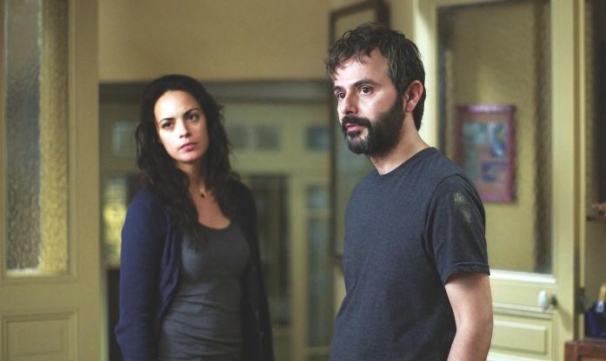 Marie searches expectantly for the arriving traveler, Ahmad, catching his eye at the airport gate but separated at that moment of encounter by transparent soundproof barriers in a lovely visual metaphor for being near yet far.†The Past†is full of such visual emotional clues. Marie and Ahmad drive to her house (once it was their house) on a rutted road that dead-ends at a railroad overpass as if to embody in concrete the filmís emotional logjam. Its characters are stuck while capable of traversing great distance.
Marie searches expectantly for the arriving traveler, Ahmad, catching his eye at the airport gate but separated at that moment of encounter by transparent soundproof barriers in a lovely visual metaphor for being near yet far.†The Past†is full of such visual emotional clues. Marie and Ahmad drive to her house (once it was their house) on a rutted road that dead-ends at a railroad overpass as if to embody in concrete the filmís emotional logjam. Its characters are stuck while capable of traversing great distance.Much has changed in the four years since Ahmad (Ali Mosaffa) left France for his Iranian homeland. Although he has returned to finalize his divorce from Marie (Bťrťnice Bejo) in a French court, he is unprepared for her new boyfriend Samir (Tahar Rahim). He might be Marieís next husbandóeven though his suicidal wife is still alive and in a comaóand the father of her next child. Ahmad had no idea until arriving that she is pregnant.
And thatís just part of the tangle. Living at Marieís house is her estranged teenage daughter from a previous relationship, Lucie (Pauline Burlet); her daughter with Ahmad, Lťa (Jeanne Jestin); and Samirís angry eight-year-old, Fouad (Elyes Aguis).
Iranian director Asghar Farhadi depicts one seriously troubled family, if the disjointed collection of individuals on the dead-end street deserves to be called a family. The secrets at the heart of their dysfunction are peeled away in steps like a mystery story, yet the lingering impression has more to do with the rancorous emotions of bitterness, jealousy, resentmentótempered by the possibility of forgiveness. The past will always haunt us, unless we can confront the ghosts.
The Past†was Iranís selection for this yearís Best Foreign-Language Picture but did not make the final list of Oscar nominees.
By Express Milwaukee
The Iran Project is not responsible for the content of quoted articles.











